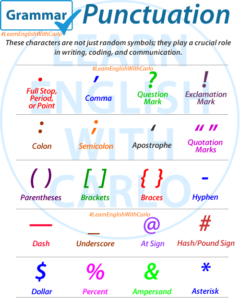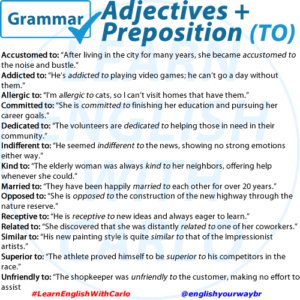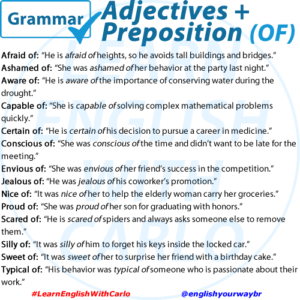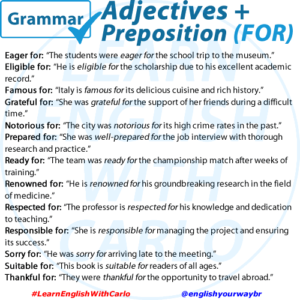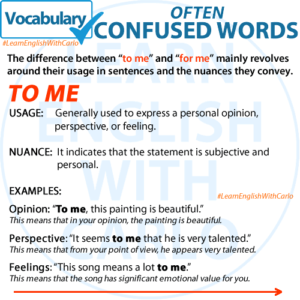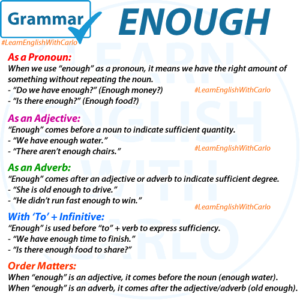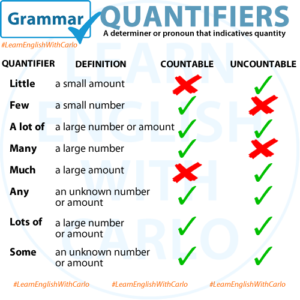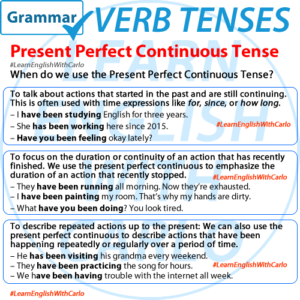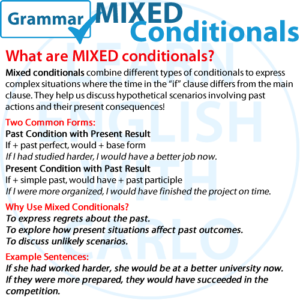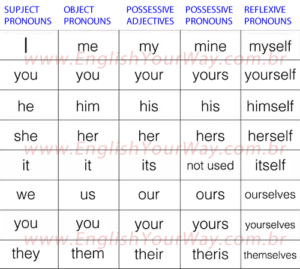These characters are not just random symbols; they play a crucial role in writing, coding, and communication. You will learn their names, definitions, and multiple uses with practical examples. Whether you’re writing an email, composing a document, or exploring programming, knowing how to use these symbols correctly will enhance your efficiency and effectiveness.
Category: INSTAGRAM
Images I've posted to Instagram
Permanent link to this article: https://englishyourway.com.br/keyboard-characters-and-punctuation-marks/
Jul 25
Adjectives + Prepositions (TO)
Let’s dive into the fascinating world of adjectives paired with prepositions! In English, certain adjectives are commonly followed by specific prepositions to express various relationships, attitudes, and qualities. Understanding these combinations can greatly enhance our language skills and enrich our expressions. Join me as we explore some examples of adjectives paired with prepositions and discover …
Permanent link to this article: https://englishyourway.com.br/adjectives-prepositions-to/
Jul 25
Adjectives + Prepositions (OF)
We are continuing our dive into the fascinating world of adjectives paired with prepositions! In English, certain adjectives are commonly followed by specific prepositions to express various relationships, attitudes, and qualities. Understanding these combinations can greatly enhance our language skills and enrich our expressions. Join me as we explore examples of adjectives paired with prepositions …
Permanent link to this article: https://englishyourway.com.br/adjectives-prepositions-of/
Jul 24
Adjectives + Prepositions (FOR)
We are continuing our dive into the fascinating world of adjectives paired with prepositions! In English, certain adjectives are commonly followed by specific prepositions to express various relationships, attitudes, and qualities. Understanding these combinations can greatly enhance our language skills and enrich our expressions. Join me as we explore examples of adjectives paired with prepositions …
Permanent link to this article: https://englishyourway.com.br/adjectives-prepositions-for/
Jul 23
TO ME or FOR ME
The difference between “to me” and “for me” mainly revolves around their usage in sentences and the nuances they convey. Here’s a breakdown: “To me” Examples: “For me” Examples: Comparing the Two Combined Use Sometimes, sentences can use both “to me” and “for me,” emphasizing different aspects: Understanding the difference between “to me” and “for …
Permanent link to this article: https://englishyourway.com.br/difference-between-to-me-and-for-me/
Jul 20
Grammar – ENOUGH
Permanent link to this article: https://englishyourway.com.br/grammar-enough/
Jul 13
Countable vs. Uncountable Quantifiers
Countable or Uncountable? We use different quantifiers in English depending on whether the noun is countable (things we can count like apples 🍏) or uncountable (things we can’t count like water 💧). Here’s a quick guide to help you out: 🔹 For Countable Nouns: 🔹 For Uncountable Nouns: 🔹 For Both: Remember, countable nouns are …
Permanent link to this article: https://englishyourway.com.br/countable-or-uncountable-quantifiers/
Jul 12
Present Perfect vs. Present Perfect Continuous
The Present Perfect and Present Perfect Continuous tenses can sometimes be used interchangeably, but they often emphasize different aspects of an action. Here’s a breakdown of when they are the same and when they are different: When the Present Perfect and Present Perfect Continuous Are the Same: Both tenses can be used to talk about …
Permanent link to this article: https://englishyourway.com.br/present-perfect-vs-present-perfect-continuous/
Jul 09
Conditionals – MIXED Conditionals
Understanding Mixed Conditionals Mixed Conditionals are a combination of two different types of conditionals, typically mixing the second and third conditionals. They are used to express situations where the time in the “if” clause is different from the time in the main clause. This allows for a more nuanced expression of hypothetical situations that may …
Permanent link to this article: https://englishyourway.com.br/conditionals-mixed-conditionals/
Jul 08
Personal Pronouns & Adjectives
1. Subject Pronouns: Subject pronouns are used when the pronoun is the subject of the sentence, meaning it performs the action of the verb. They replace nouns as the doers of the action. Here are the subject pronouns in English: For example: 2. Possessive Adjectives: Possessive adjectives show ownership or possession. They come before a …
Permanent link to this article: https://englishyourway.com.br/pronouns/

